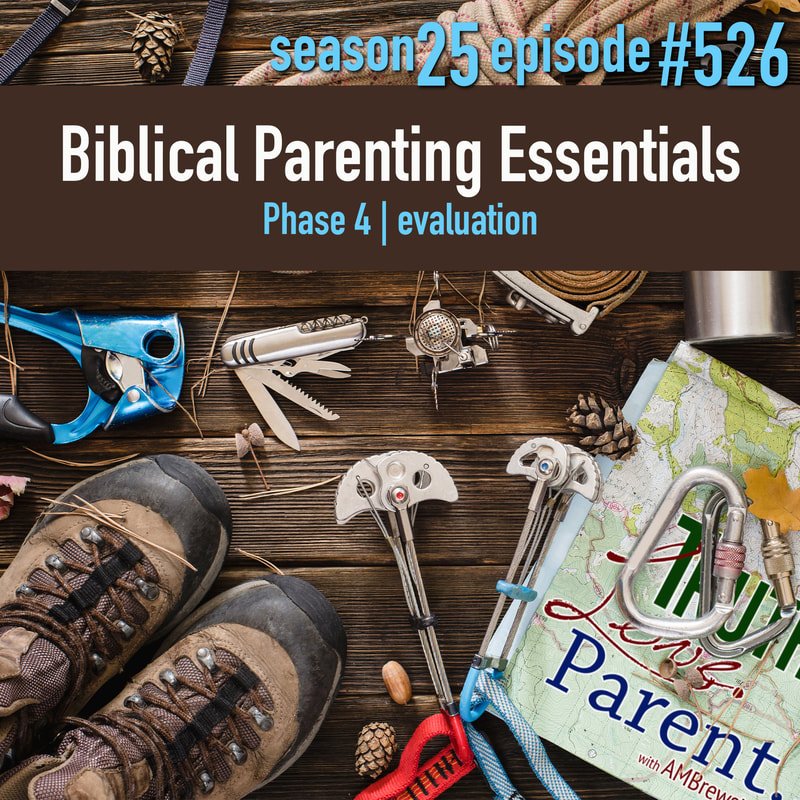[ad_1]
Click the link below to download the PDF.
We’ve talked about Part 1 and Part 2 of Biblical Parenting, and then we dug deeper into Part 2 by breaking it down into 4 Phases. And we have talked about content, methods, reinforcement, application, and evaluations.
And that’s where we are headed today. We want to see if there’s a way for us to biblically evaluate our Training Phase of Biblical Parenting. How will we know it when we see it.
But before we jump in, I want to invite you to follow me on Facebook, Twitter, LinkedIn, Instagram, and—if you’re on Pinterest—I have a board now there as well. You can search AMBrewster on Facebook, Twitter, LinkedIn, and Instagram, and if you go to the Evermind Ministries Pinterest profile, you can check out the AMBrewster board.
I try my best to post encouraging, challenging, and uniquely Aaron-type stuff, and I try to interact with everyone who comments and shares.
While you’re on the world wide web, be sure to check out TruthLoveParent.com for today’s free episode notes, transcript, and related resources. All the links you need will be in the description.
And now let’s talk about how to evaluate your training.
Unfortunately, not enough parents are asking that question. To be honest, the average Christian parent just assumes that everything they do is training their child in righteousness, but that couldn’t be further from the truth. The reality is that we’re more likely than not training our kids in our worst character traits and behaviors, but unless they are participating with our teaching, reproving, and correcting, they are definitely not being trained in righteousness.
So, let me congratulate you for asking the question. Your curiosity at least reveals that you no longer think that everything you do and say is training your child in the way that they should go.
You have learned the extremely important truth that if your kids aren’t participating, you’re not correcting or training.
Even then, you’re becoming wise enough to realize that just because your kids look like they’re participating, it doesn’t necessarily mean they are. So, what’s a parent to do?
First, let me start by reminding you of your calling. You have been chosen by God to be His follower. You are commanded to obey Him. You are expected to worship Him by parenting as He commands regardless of whether your kids submit or not.
Second, since you are not God, you will never know anything for certain when it comes to your children’s spiritual maturity. You can think you know, believe you know, hope you know, but man looks on the outward appearance, and only God looks at the heart. That’s why . . .
Third, you have to trust God to do His job and cycle back around to the first truth. God will do what you cannot do, but you have to do what you can do in His power and for His glory.
That’s why our first evaluative tool today is . . .
1. Are you speaking the truth in love for the glory of God?
The truth is the content from God’s Word which is in line with His meaning and interpretation—to the best of your ability.
The love is the method. Since you only want God’s best interest for your kids, you will communicate with them and interact with them by only giving them the best that God would have you give them. This—of course—doesn’t mean that everything you say and do is comfortable and syrupy. No! Many times your kids are going to need chastisement, reproof, admonishment, rebuke, and the like. But the manner of those times must be the love of God.
Be sure you check out our Family Love Series if you’ve never heard it. It’s one of the most foundational concepts your family needs.
And the glory of God is the motivation. To many of us parent to achieve our own wishes and desires. I know I’ve done that, and I still do that far too often. But as I mentioned earlier, our parenting must be an act of worship to God for His sole honor and glory.
We need to love and value and adore Him so much that all we want to do is please Him by obeying Him.
And if you are doing that, you are being a Truth Love Parent. You are doing your part.
So, that needs to be in place if you want to know if you’re in the Training Phase of Biblical Parenting. But—as I’m sure you all remember—unless your kid is there with you . . . you’re not training, you’re simply teaching.
This is important, but the methods and purposes of teaching are very different from training. Teaching is Phase 1. That means that there’s a very different relationship between you and your child, and you need to be aware of that in order to do it well.
So, how will you know if they’re truly participating?
Well, honestly, I could simply work back through the evaluative tools I gave you for the Correction Phase. And all of those are true and apply to this Phase, but I wanted to come at this from a different angle, and I wanted to simplify the tools as much as possible.
So, I’m going to piggy back off a recent podcast episode I did for The Celebration of God. By the way, if you have not yet subscribed to The Celebration of God and listened to the introductory episodes, you are seriously missing out.
Anyway, one of our most recent episodes was about the Life of God in us. In that episode, I talked about the main reasons that God leaves us on the earth after we’re born again.
He wants us to be salt and light in the earth, but our ability to do that as well as we can is contingent on our sanctification. That’s the process by which God conforms us into the image of Christ. So, the Lord has given your child physical life, but Lord willing, He’s also given your child spiritual life in justification. Remember, you can train an unsaved child in secular things, but you can’t train an unsaved child in spiritual things.
Anyway, if your child has been born again, they have spiritual life, and God expects them to grow in that spiritual maturity. And the ways He expects us to grow in spiritual maturity are the same things we can use to evaluate whether or not our kids are participating in the Training Phase, because that’s exactly how God ordained that we would grow in our sanctification, through discipleship—through training.
Also, even though we’re going to take a break on this podcast after today’s show, we’re continuing with The Celebration of God podcast. And—believe it or not—our next series of The Celebration of God will follow this series so well.
It’s called The Evidence of Spiritual Life series. We’re going to be working through II Peter to learn about God’s expectations for our spiritual maturity, and we’re also going to learn that if these realities are not true in our lives, that very well may be evidence of the fact that we never actually had spiritual life in the first place. And we can use the same criteria for our kids.
In fact, I would strongly recommend your whole family listen to that series. I have used this study with many different counselees both in one-on-one formats as well as family sessions.
Now, at this point, I don’t have a plan on releasing free LifeWork assignments or anything like that, but the teaching time is necessarily foundational to the counseling process, and will be exceptionally helpful for your family as they try to determine if they have spiritual life and—if they do—how God expects them to be maturing . . . how He expects them to be training.
So, be sure to subscribe to The Celebration of God podcast and listen to The Evidence of Spiritual Life Series with your family.
And the sooner you would like for the Truth.Love.Parent. podcast to return to regularly publishing new episodes, please consider donating to the ministry. The only reason I’m taking a break at this time is that I absolutely need to start working a second job so that I can provide for my family. But when Truth.Love.Family. receives enough donations that they can pay me full-time, I will be so excited to throw myself back into this ministry full-time.
Now, with that said, and before we get into the meat of today’s topic, let me just say that I will still be traveling and speaking, counseling, creating content, and interacting on social media. I have a book in the works, we have an app coming out, and we have exiting things on the horizon. But since I can only work part-time on TLP, I’m refocusing my efforts to those things instead of the original podcast content.
Now, also, don’t unsubscribe from Truth.Love.Parent., because I am hoping to get back on here from time to time with new content. It just won’t come at you every week.
But maybe it might if we get enough support! Please pray, please tell people about the ministry, and please give.
Alright, how can we tell if our kids are participating with us in the Training Phase?
2. Are they growing in the character of Christ?
Now, though this is the foundational most important evaluative tool, I will agree that this is harder to assess than the following tools. However, the next two points are helpful in revealing this one. We just need to make sure that we’re observing and interpreting the situation as biblically and as carefully as possible.
So, let me explain what I mean about growing in the character of Christ, and then I’ll give a radical idea for trying to determine if they really are.
As we’re teaching our kids about the character of Christ, we should also be teaching them how to put on that character. We’re talking about the sanctification lists like the Fruit of the Spirit, the Armor of God, and all the others peppered through the Bible. We’re reading the Old Testament together in order to better know God and emulate Him. We’re looking into the Gospels to learn Who Jesus was, and we’re trying to please Him by becoming more like Him.
Now, I start with this point because the following two points are completely vain and worthless if they are not firmly rooted in this point.
We humans are so incredibly superficial. We’re all like impersonators who are really good at putting on an external show, a facade of righteousness, superficial obedience, and freckle-deep morality. But mere outward pretense is not the product of true spiritual life.
Three times in the Gospels we read Jesus’ Parable of the Soils. If you’ve never listened to our Four Children Series, I strongly encourage you to do it. It reveals the four ways that all children respond to truth.
Anyway, the Rocky Soil represents an intellectual, outward conformity to a system. Jesus described it as a seed that fell on shallow, well-watered ground, but because there was nowhere to put down any real roots, all the plant’s energy was invested in upward growth. Such plants often grow taller and bushier faster than all the others who are developing solid root systems.
But then Jesus said that when the drought because of the Word comes into their lives, they are the quickest to wither and die because the ground dried up and they didn’t have a root system deep in the moisture rich soil.
These Rocky Hearted Children never produce fruit of repentance, and the superficial rocks of intellectual assent and theoretical acquiescence leave them spiritually dead regardless of how they look on the outside.
Therefore, no matter what I say in the next few points, even if your child were the best actor on the planet and they could play-act all the right words and deeds, they would still be spiritually dead. They’d be just like the pharisees—beautiful on the outside, but full of dead men’s bones. Their “obedience” would be hypocritical and empty.
This is why in Luke 11, while condemning the Pharisees, Jesus said, “Woe to you Pharisees! For you pay tithe of mint and rue and every kind of garden herb, and yet disregard justice and the love of God; but these are the things you should have done without neglecting the others.”
Was it right to tithe their herbs? Yes. In Leviticus 27:30 we read, “Thus all the tithe of the land, of the seed of the land or of the fruit of the tree, is the Lord’s; it is holy to the Lord.” The passage even goes on to say, “If, therefore, a man wishes to redeem part of his tithe, he shall add to it one-fifth of it.” What I’m trying to say is that the measurements mattered.
However, they fulfilled the outward requirements without possessing any true spiritual life. They didn’t do the right things in the right ways for the right reasons. They lacked justice and the love of God. Jesus commanded them to do the internal things and the external things. He said, “but these are the things you should have done [the tithing] without neglecting the others [the justice and the love of God].”
When Samuel told Saul, “to obey is better than sacrifice, and to heed than the fat of rams,” he wasn’t implying that offering sacrifices wasn’t required to obey. In fact it very much was at the time. But he was teaching Saul that true obedience isn’t merely external. Again, if you haven’t heard our Teach Your Children to Obey Series, I strongly encourage it. True obedience demands inward spiritual life and motivation.
So, if you’re child is not maturing in the character of Christ, it doesn’t really matter what outward show is put on, and I’ll be reminding us of this point as we consider the final two.
However, if they truly are being transformed into the image of Christ by maturing in His character, they are definitely participating in the Training Phase with you.
Now, how are you to be able to tell? Well, remember my admonishment from before. You need to trust God on this one, but that doesn’t mean we shouldn’t do the careful observation, investigation, and—dare I say it–interrogation necessary to know their hearts.
Remember Proverbs 20:5, “A plan in the heart of a man is like deep water, But a man of understanding draws it out.”
We need to be parents of understanding.
Let’s quickly consider this idea of interrogation.
I believe that when most people hear that word they think about waterboarding and other forms of torture. But those in legal fields recognize that interrogation is necessary and valuable when done correctly.
In fact, Merriam-Webster defines interrogation as “a formal and systematic questioning,” and their first example usage is “She conducted a skillful interrogation of the witness.”
Their last usage example is, “And during interrogation, instead of just listening for inconsistencies in what is said, agents are being taught to look for minute physical reactions on the faces of people being questioned.”
If you listened to our Parenting Lying Children, then you recognized what that last example was describing.
Here’s my point, as a trained personal safety specialist, I can say that most people in the world are painfully unobservant. But being a parent requires that we be more than observers. We need to be investigators who scour the information at hand, probe, and ask questions. And when it comes to asking questions, we need to be interrogators who can—by the grace of God and to His glory—draw out the plan in our children’s hearts.
Alright, moving on, our faithful training coupled with our children’s conformity to the character of Christ will show that we are in the Training Phase. But what are some other ways to tell if our kids are being conformed to the character of Christ?
3. Are they speaking the words of Christ?
Jesus is the way, the truth, and the life. Ephesians 4:5 command us to speak the truth in love. We are not only expected to speak that which is true regardless of whether or not we have recorded evidence that Jesus said it, but we’re also to make the entirety of the Scriptures part of our interactions with people.
That means that it’s completely acceptable for us to expect that our kids speak the Word in their daily lives. We all quote movies, song lyrics, and authors all the time. We all talk about what’s important to us. So, why don’t we and our kids quote the Scriptures more often? We don’t because we’re not as conformed to the character of Christ as we should be.
On the other hand, if we’re maturing in the character of Christ, how could we not also talk about what is important to Him?
Last time we discussed guiding conversations with our kids by keeping close tabs on their level of participation and—more importantly—truthfulness.
If our kids are working through difficult questions in their lives, and they come to us, and as they explain the situation, they’re coming to all the right conclusions about how God would have them move forward, all we have to do is sit back and listen. And when they ask us what we think, we can affirm all the biblical truth they already espoused.
And that’s what we’re working toward as parents. We want to train our kids to self-counsel, to self-parent. We want them to know, understand, and believe God’s Word so well that they don’t need your help to glorify Him in their lives.
So, are your kids speaking biblical truth? Of course, someone can talk out of both sides of their mouths, which is why our next point needs to be factored in as well, but—for the most part—doctrinally accurate understanding coupled with theologically applied wisdom is an evidence of spiritual maturity.
But there’s another important thing to consider. Spiritually mature individuals don’t just talk about truth with those who are more mature than they are, they talk about truth with those who are less spiritually mature than they are.
It may be evangelistically, it may be in discipleship, it may be answering a question or simply encouraging someone, but believers who are being shaped into the image of Christ are going to talk about the things that are important to Him. They’re going to be salt and light. They’re going to be discipling. They’re going to have more mature believers from whom they’re learning, similarly mature believers they’re sharpening, and less mature believers they’re teaching.
And lest you think this is too much to ask of teens and children . . . may I politely say that you’re wrong. Even very young children love to explain the things they’ve recently learned or figured out. They try to teach their siblings how to tie their shoes, they explain to you how they built their lego tower, they provide you the rundown of all the cool things they learned in school, they give you the backstories of their favorite book characters, and the list goes on.
This is how God created humans to function. When we’re passionate about something, we talk about it, we even go so far as to try to convince others about it.
So, if your child’s communication is aligning with the communication of Christ and is being biblically applied, and their salt and light is growing saltier and brighter, then you have a child in the Training Phase.
How do you know if your child is growing in the character of Christ? Well, are they speaking the words of Christ, and . . .
4. Are they doing the deeds of Christ?
Only when we conform to the character of Christ and speak the words of Christ can we be certain that our actions will also be in conformity to Christ.
However, we must be careful because so many people are giving the exact opposite messaging. They’re preaching the sermon of the Pharisees. They demand that we do certain things without the necessary foundation, and though such actions may look godly, may appear biblical, they’re not pleasing to the Lord.
Let’s allow Matthew 7:22-23 speak for itself, “Many will say to Me on that day, ‘Lord, Lord, did we not prophesy in Your name, and in Your name cast out demons, and in Your name perform many miracles?’ 23 And then I will declare to them, ‘I never knew you; depart from ME, you who practice lawlessness.’”
Doing isn’t good enough. The doing must be motivated by God, and that only comes as we are genuinely conformed to the character of Jesus.
Now, let’s be clear right off the bat. This is not a suggestion that your kids need to participate in the supernatural deeds of Christ. This is not a call to perform miracles, speak in tongues, prophesy, or cast out demons. This is a call to serve, minister, help, lead, obey the Father, and sacrifice the way Jesus did.
Do your kids serve others? Are they hospitable? Do they go out of their way to help people? Do they sacrifice? Do they do the will of their Father Who’s in heaven? Is their life characterized by giving? Would the people who know them best say that they prefer others above themselves and outdo others in showing honor?
If they are truly growing in the character of Christ, they will serve as He served, they will love as He loved.
After washing the disciple’s feet in John 13, Jesus said in verses 12-16, “Do you know what I have done to you? 13 You call Me Teacher and Lord; and you are right, for so I am. 14 If I then, the Lord and the Teacher, washed your feet, you also ought to wash one another’s feet. 15 For I gave you an example that you also should do as I did to you. 16 Truly, truly, I say to you, a slave is not greater than his master, nor is one who is sent greater than the one who sent him.”
The unfortunate penduluming of our church culture either tells us to “fake it till we make it” on one side or “it doesn’t matter how you live as long as you love Jesus” on the other side.
The reality is that a life that belongs to Christ is going to be transformed into His image from one degree of glory to another. They’re going to mature in the character of Christ, they’re going to speak the words of Christ, and they’re going to live like Christ.
[ad_2]
Source link







You must be logged in to post a comment.